It goes without saying that the world of dentistry is incredibly competitive, and the same is true for the industry when it concerns online marketing and SEO (search engine optimization).
With this in mind, it is crucial that dental surgeries are implementing the best and most up to date practices for their sites.

In this article, I’ll discuss some of the best and most important factors that you must consider before and during a dental SEO campaign. You can do some of these things yourself or find an agency/consultant that can help you with dental SEO services.
Most dental practices use PPC extensively. However, PPC can be expensive and when done right SEO can help you drive low cost leads in the long run.
From the need for local SEO, right through to making the best out of social media channels, I’ve also interviewed some of the leading minds working in the dental SEO niche.
Why SEO is important to a dental practice
No matter what industry you are in, or how large your business might be, there is always something to be gained from an intelligent, creative, and technically backed SEO campaign.
Whether you are a brand-new dental practice or one that has been around for decades, a sound knowledge of best SEO practices can help you drive both potential visitors to your website.
By building authority, expertise, and trustworthiness (also known as E-A-T) you can take on and get ahead of the competition in your local area. You can get top Google rankings and drive highly qualified leads and customers.
How a dental practice can measure SEO investment and ROI
It is a common assumption that SEO can’t be measured, but the truth is that the results of an SEO campaign can be measured on a great variety of real factors, including:
- Increase in search engine rankings across crucial commercial keywords.
- Increase in the number of enquiries received.
- Organic traffic increases.
- Revenue Increases.
- Growth in brand searches.
And there are of course a variety of tactics, implementations, and marketing strategies that can benefit dental practice websites.
Getting your company on board for dental SEO
Of course, the first step of any SEO campaign is getting people on board. When companies undergo technological changes, especially when it concerns aspects of digital transformation, it can often be difficult to implement change or inspire confidence.
Furthermore, if a board member or another employee has had bad dealings with an SEO company before, it can be even harder to instil confidence around the benefits and rewards of digital marketing.
In my experience, however, by offering jargon-free explanations, alongside honest and transparent roadmaps, even the least technical person should be able to understand the benefit of what SEO services can provide.
Although personally, I tend to steer clear of projections, by explaining the benefits of certain elements of work (such as the implementation of new pages or fresh content), people can piece together the many aspects of a campaign towards a greater understanding of the overall goal.
Getting your website in order
It could be said that the bulk of SEO was once about link campaigns and offsite marketing, however, a greater and more technical number of considerations must now be taken into account.
Much of this revolves around the technical capability of a website, and the quality of the offering that it can provide to the people who use it. You should seek the services of a SEO specialist, or use your in-house specialist, to cater to these requirements.
Below are some of the more basic checks that you must analyse at the start of any SEO campaign:
Ensure your website is well structured
A good website structure is key for any website so that both users and search engine crawlers can easily navigate throughout its pages.
Google and other search engines reward websites with strong and clear structures so that they perform better in their chosen verticals.
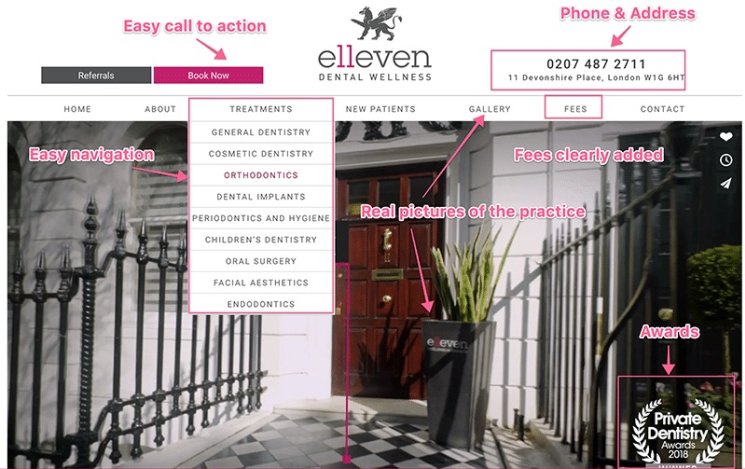
This dental practice in London nails the basics.
Navigation is also critical
A poor navigation system will result in both users and search engine crawlers not being able to find their way around a website.
From internal link architecture, through to well-designed navigation bars, users need to be able to explore your website with ease, and always be within two clicks of the homepage.
Ensure all pages can be indexed
Although there are certain pages that you might not want to be indexed by search engines, such as thank you pages, or printable pages, it is important that you know exactly which pages are being crawled and indexed by search engines.
You can check this by taking a look at your Index Coverage Status Report within Google Search Console.
Check your loading speeds
As more people are now accessing websites through mobile devices, it is becoming increasingly important that sites load quickly and efficiently.
Site speed is also a ranking factor for both mobile and desktop sites.
You can check the speed of your site using Google’s Lighthouse and PageSpeed Insights tools.
Consider mobile optimisation
Due to the fact that so many people are accessing sites from mobile devices, it also means that sites must be optimised from a mobile perspective.
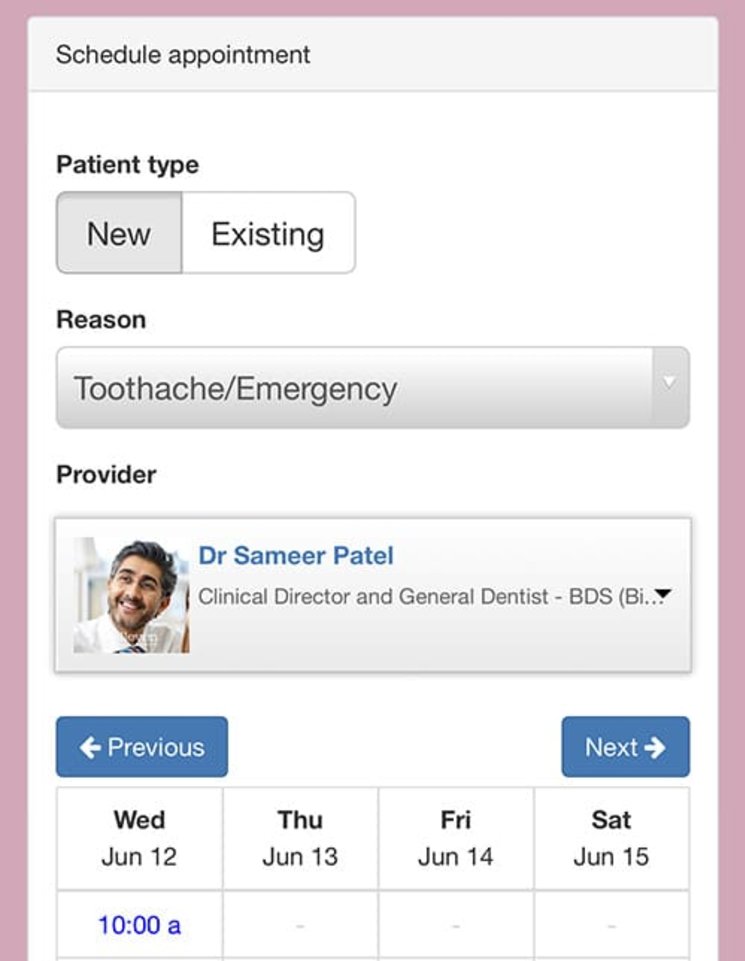
Here is a dental booking optimised for mobile users.
This can include anything from the implementation AMP pages, right through to ensuring that the website design is intelligent and responsive to mobile devices.
Set up tracking properly
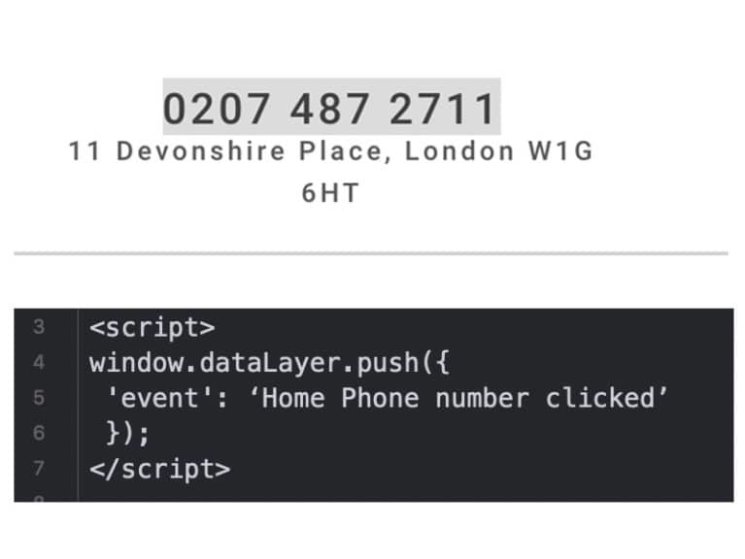
You can use data layers to push an event via the Google tag manager and convert the event into a goal in Analytics. Then you can measure the number of clicks to the phone number.
Ensure your contact information is visible throughout the site Telephone numbers, addresses, and even emails should be visible and easy to find.

In this example the navigation is clear and contact and location information is easily available.
Although displaying them on your contact page is fine, it is also an idea to have phone numbers and addresses within the footer of every page to ensure that no one has to click around or leave a page in order to contact you.
Consider implementing a booking form
Now more than ever people are booking crucial services through booking forms and they are a great way to ensure that your customers or patients can book an appointment without ever having to leave the site.
If you’ve not yet implemented booking software on your site, have a read through some of the best-reviewed booking and appointment software currently on the market.
Focus on conversion
By following best practice guidelines and ensuring that your site is user-friendly, you can focus on gaining more conversions.
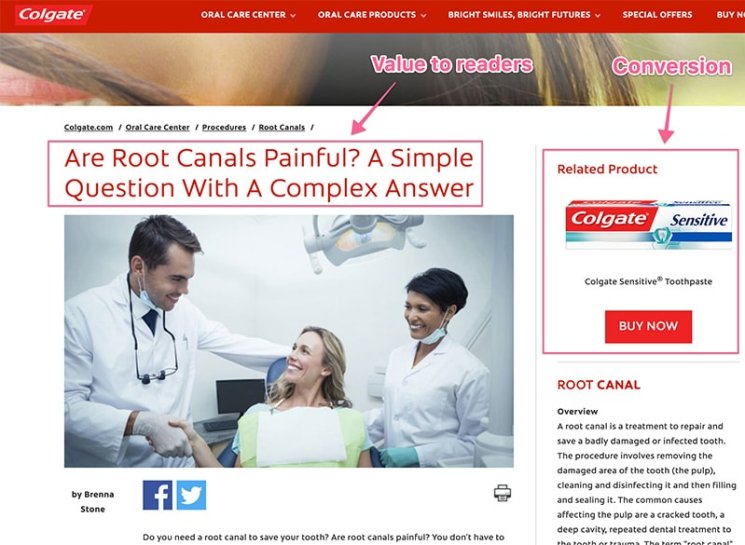
Here is a good example of a conversion optimised content page.
Keep your site active by updating crucial information and provide supporting articles and FAQ pages to increase trust and ensure that you provide a good user experience.
Remember to include crucial information
When businesses are knee deep in analytics and trends, it’s often easy to forget about some of the simpler and more obvious requirements, such as ensuring that the opening and closing times are available for your dental office.
If relevant, ensure that your prices are displayed in easy to find locations, or are detailed within FAQ pages.
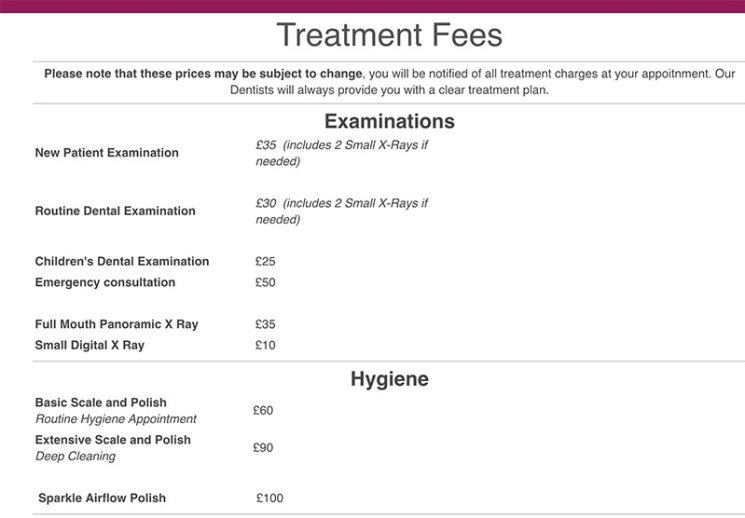
While we’re here, providing information such as parking and disabled access offers a great level of care and it can save time from having to discuss such issues in a telephone conversation.
Local SEO must be a top priority
Since the majority of people searching for dental surgeries will be searching for businesses in their local area, it is crucial that local considerations are catered for.
Have a read through some crucial aspects below:
Claim your Google My Business Profile
Google My Business is a free service offered to businesses so that they can be found by people searching within the local geographic area.

Currently, Google My Business is free and it can help you control how you appear within your local area, as it gives you the ability to monitor and refine reviews.
You can get started by going to https://business.google.com. Make sure to fill all the information and keep them updated. You can also manage your Google reviews through the My Business account.
You should also consider Bing Places for Business, which is a similar service for those who search on Bing.
Create local landing pages
If you happen to have more than one location, it is worth considering creating local landing pages so that you can rank and generate leads from those areas.
For example, The Colosseum dental practice in Norway has local landing pages for every province and city, and details crucial information such as contact details, availability, opening times and ability to make a booking.


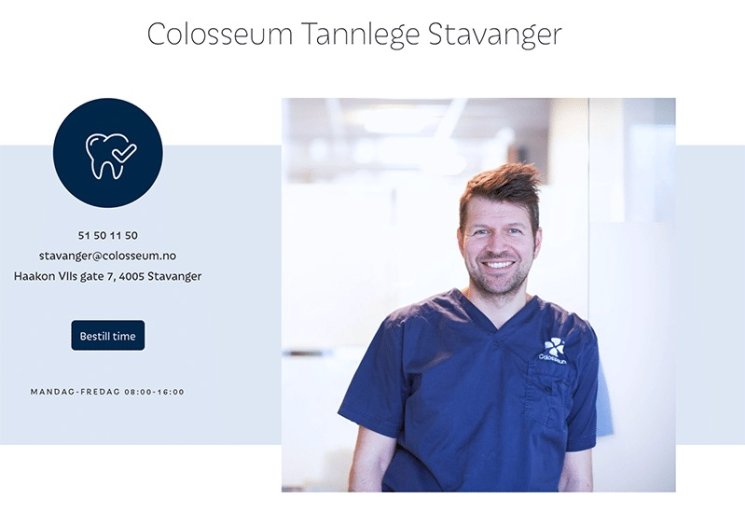
Simply from these pages, they rank for location-based queries quite well.
Optimise for local map queries
Now more than ever, users are searching for services and products near them, often using the term “near me”, which means that local businesses need to optimise for their geographic locations.
Ensure that your content on local pages involves important search criteria such as, for example, “dental practice” + “your city”.
To learn more about optimising for “near me” queries check this fantastic article.
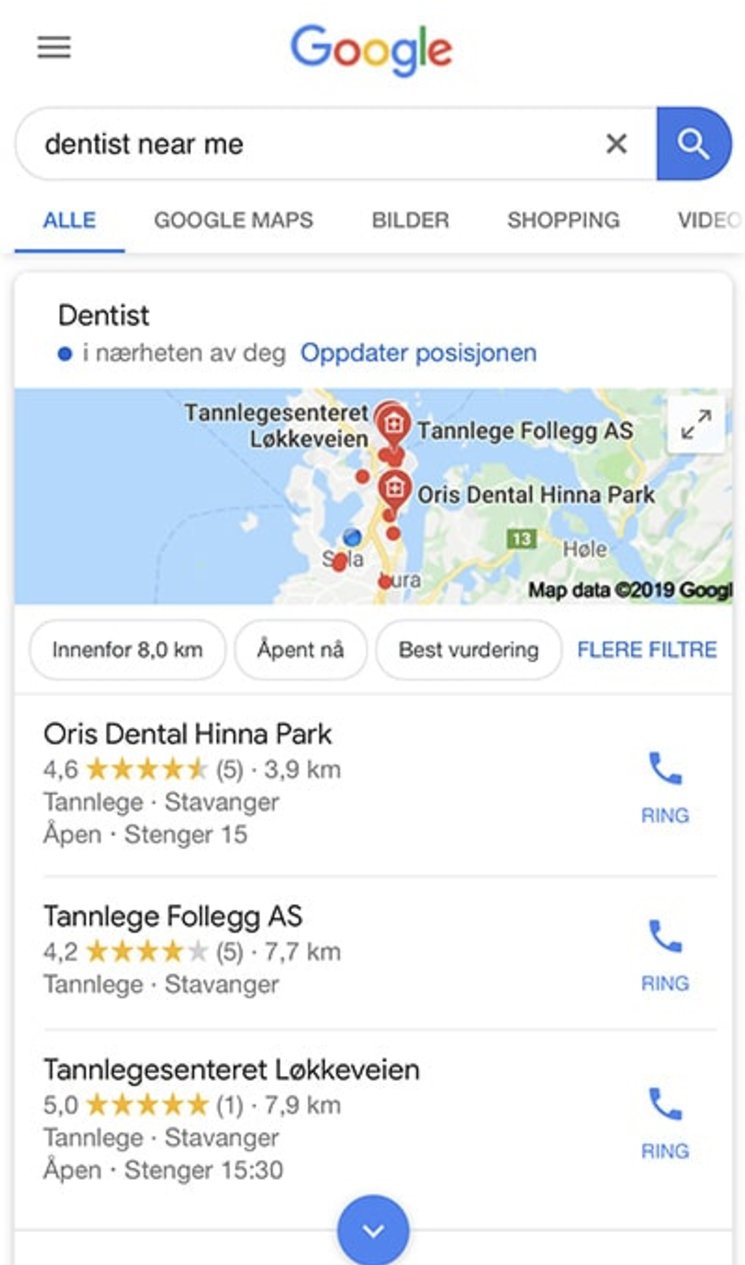
It’s important to optimise for local map packs especially for mobile devices.
Ensure that your NAP details are correct
By providing a proper name, address, and phone number details on your site, you are providing strong signals to search engines that your business is legitimate, and this can provide great benefits for local search campaigns. Many businesses change their contact numbers and addresses and often forget to clean up the citations online. If you don’t clean this up, you will be sending the wrong signals to Google. I highly recommend using this citation clean up and repair service.
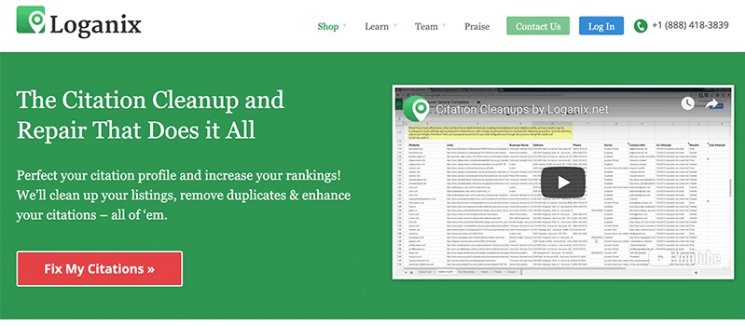
Sign up to local business directories
Local business directories can provide value to local search campaigns and can even help you develop a good link profile.
You should consider joining your local chamber of commerce, alongside getting listed in business directories such as Yelp, Yahoo, and Yellow Pages.
It’s also worth adding your company to any relevant industry business directory.
You can use the citation building service by Loganix or Whitespark
Add schema markup to your site
Adding structured data to your website helps search engines quickly identify and understand what your site does, as well as the purpose of individual web pages.
In fact, there is also specially created markup for dentists that you can add to your website.
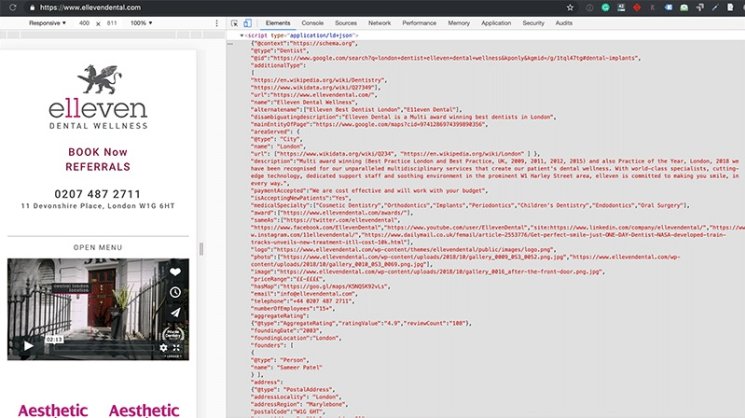
Here is a perfect example execution of Dentist schema.
Provide relevant imagery and videos
Ensure to give people a good idea of what your business looks like by offering pictures of the company, as well as any relevant pictures of staff.
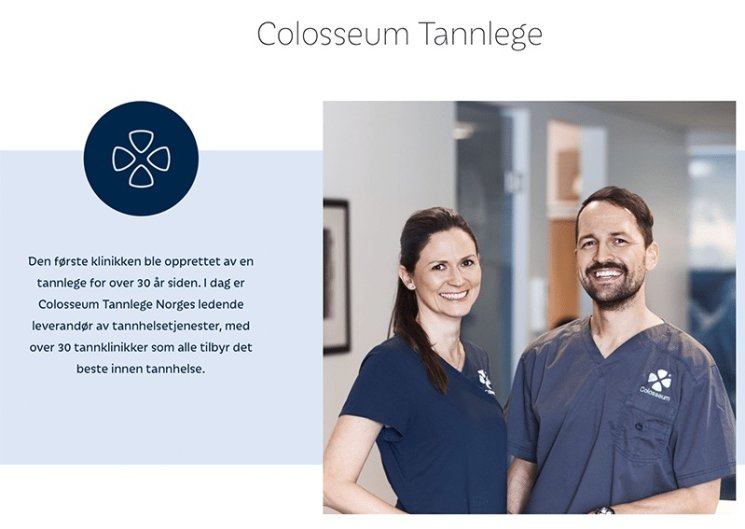
Image copyrighted to: https://colosseumklinikken.no used for demonstration purposes only.
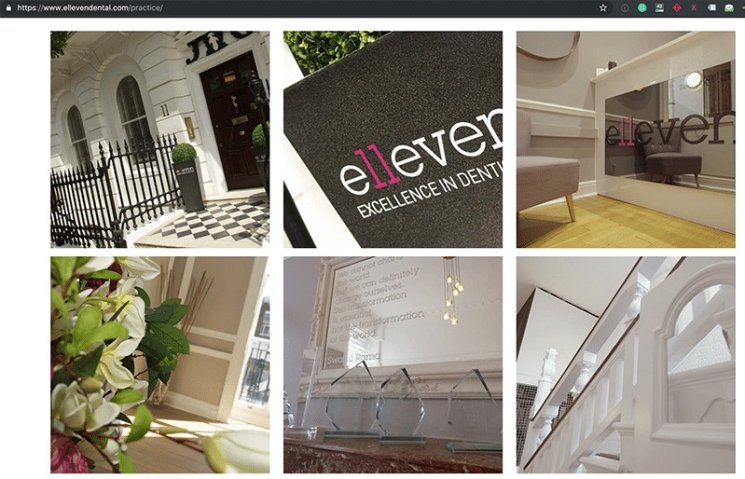
Image copyrighted to: https://www.ellevendental.com used for demonstration purposes only.
Use next-gen image files and ensure to optimise them using Google’s best practice recommendations.
Videos can show the process and facilities more clearly. Dental clients often have anxiety and fear, so a well-made video can put them at ease. The video assets can be shared on Social media as well for driving your brand awareness. Just remember SEO is not just about content and links.
Get and manage customer reviews and testimonials
Reviews and testimonials are crucial trust factors for both users and search engines. It also gives businesses the opportunity to respond to negative reviews and criticism.
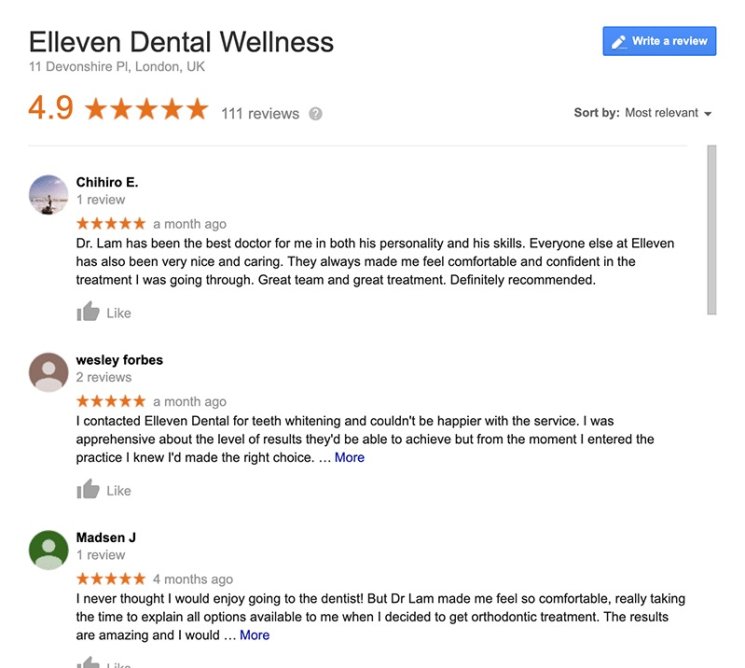
It’s also worth remembering that Google aggregates reviews from multiple channels, such as Trustpilot, Yelp, and Feefo, so ensure to periodically check through and tender your reviews.
Every business gets negative reviews and you can deal with them in a smarter way. Keep in mind others will be reading and be polite in your replies and how you handle a situation. You don’t want to turn a bad situation into a worst one.
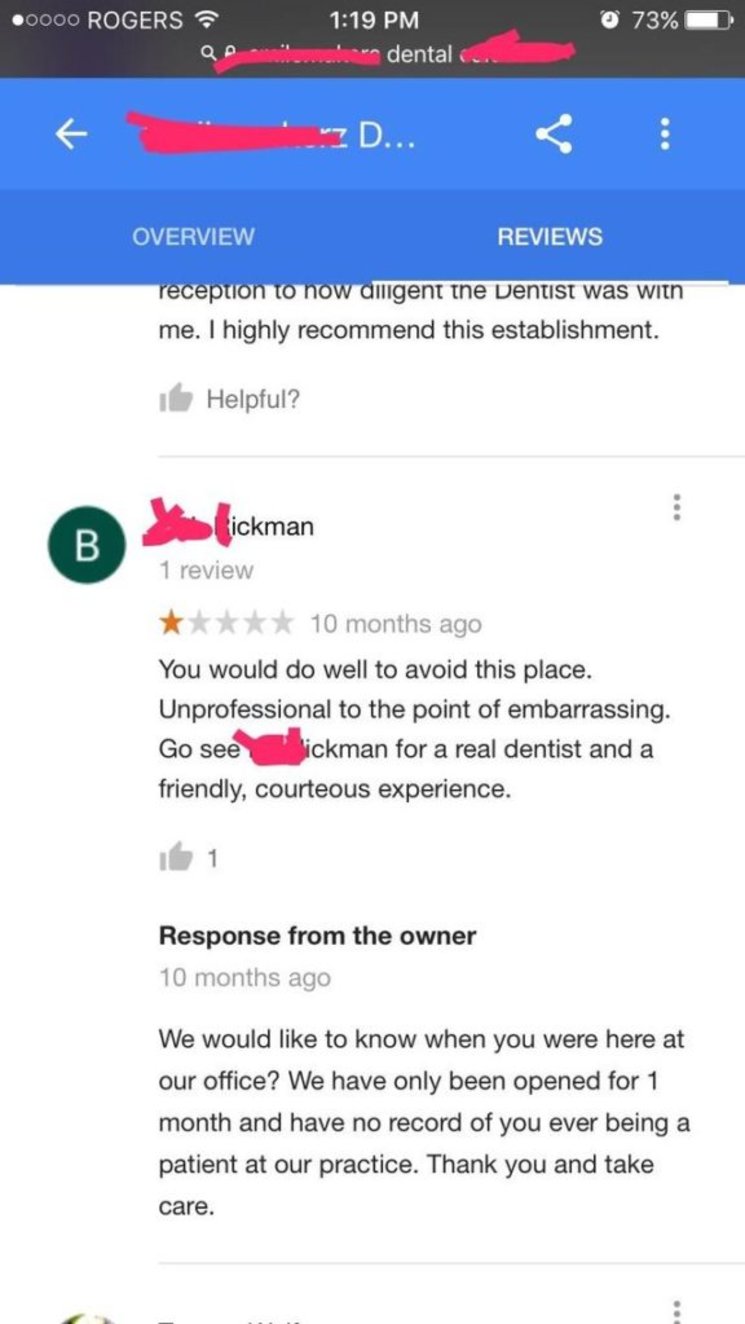
Source: Reddit
If you don’t have time to email customers asking for reviews then you can sign up to a review service like Trustpilot. The pro version will let you integrate your CRM with their system so an automated feedback email will be sent to your customer after an appointment.
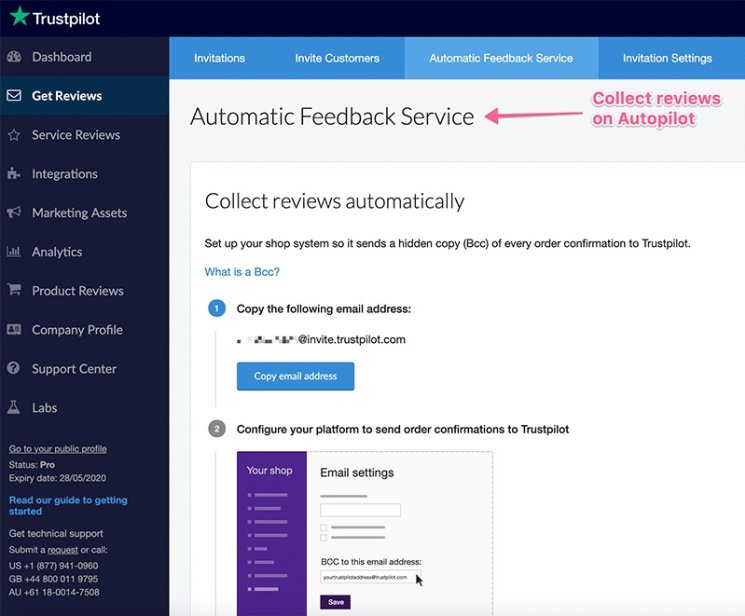
Having schema data in your webpage can also help you get star ratings in SERPs. It’s known to increase click-through rates.

If you’re a WordPress user, there are many Plugins available to implement schema data. I recommend using the Rank Math SEO plugin. It has schema built-in and easy to use.
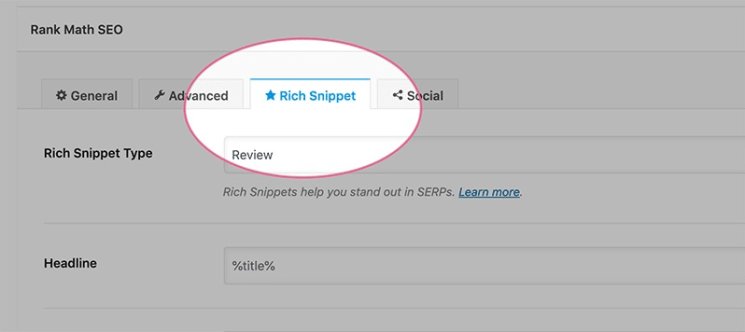
Start a regular blog if you do not have one already
Keeping a regular and well-written blog on your site not only offers positive signals to search engines that your site is healthy and active, but it also enables you to cater to people searching for information, such as symptoms and ailments.
By researching keywords and search terms with an informative intent, you can help your site cater to informative searches and it also provides you with the opportunity to build a sense of authority and trust.
Take a look through some of the basic tips and best practices you should consider for content creation:
1. Take time out to research important keywords and consider intent between commercial and informative searches. By focussing articles around specific intents and situations (such as whether a customer is merely looking for information or are ready to book an appointment), you can manage what type of traffic your pages receive. Kwfinder and Ahrefs are great keyword research tools to consider for this purpose.
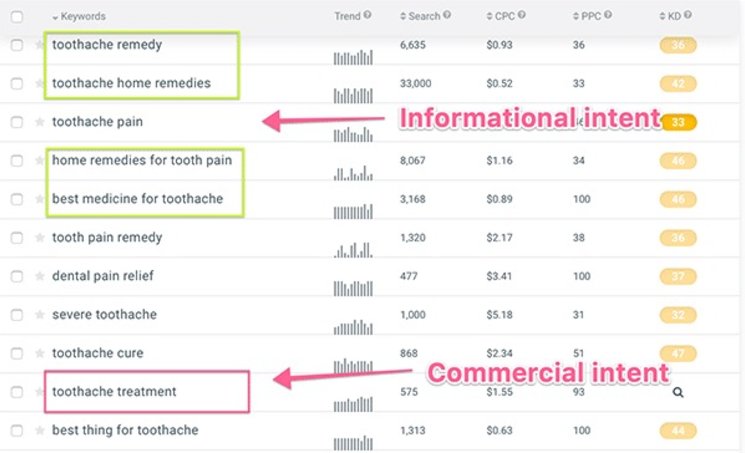
2. Ensure to create categories for different topics, such as ‘paediatric dental’, and remember to provide links to commercial pages and previous articles that cover similar issues.

3. Consider some of the topics that people will search for and provide information and content that can provide information for their problems or interests. For example, an article about “How does smoking affect teeth health?” is something that will help smokers understand the damage that they are doing to their teeth.
In this example for the above query, you can create a detailed article and it will serve as a top of the funnel content. Once the user lands on the article you can push them further down the funnel by adding relevant content to the above query. Such as “Teeth whitening services for chain smokers” for example.
4. Create trust by providing information backed by relevant sources and medical information. SEOs often talk about creating a sense of expertise, authority, and trustworthiness (E-A-T), and by doing so, you are sending strong signals to both search engines and users.

As you can see, the article on WebMD has added references and the medical professional’s credentials to create authority. They have a dedicated bio page about him as well.
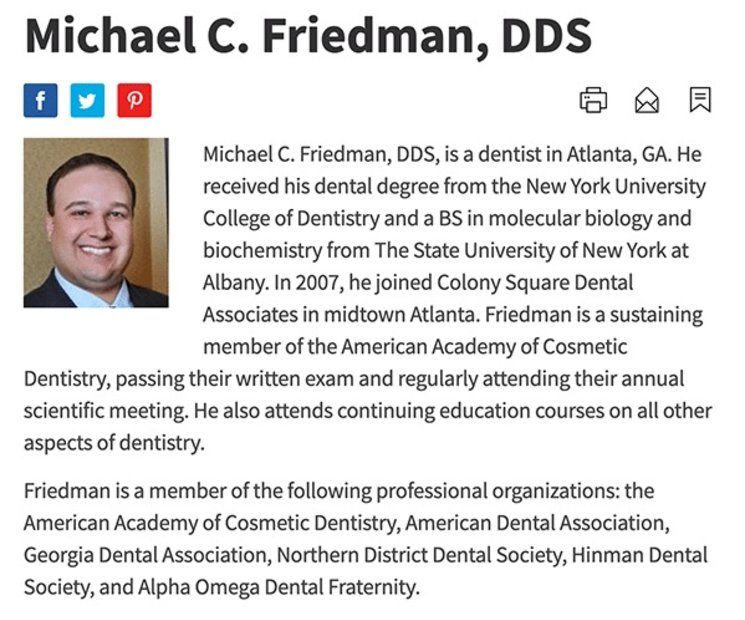
If you search for this medical professional’s name, it brings up results clearly showing he is well known in the industry and trustworthy.
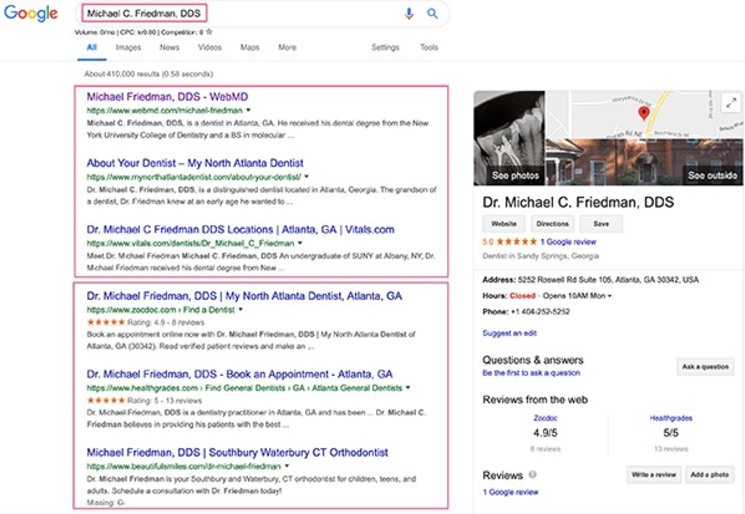
5. Research what your competitors are doing with their supporting pages and articles and take inspiration from their topics and strategies so that you can emulate them within your own blog.
6. Although this may seem obvious, remember to promote your articles through relevant social channels so that you can generate comments and shares.
Build relevant links to your site
There is a range of strategies for creating “noise” around your business so that you can generate local and even national coverage.
If you have any business news, for example, you could consider writing a press release around the topic for local newspapers or magazines. You could even send it to the appropriate industry magazines.
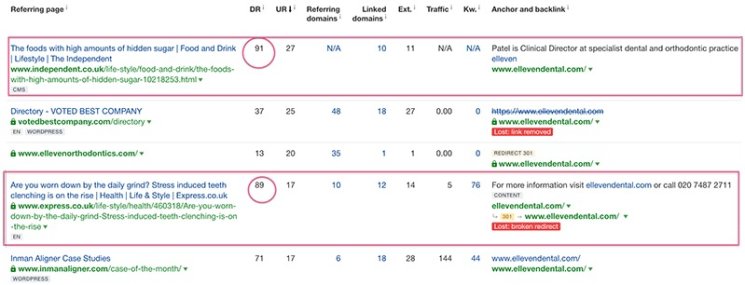
In this example, the above practice is participating in dental related articles and landing high authority links from national newspapers in the UK.
It’s worth noting that not all SEO agencies offer PR services, however, so it might be worth getting in touch with a relevant marketing agency so that you can plan out a strategy together.
Another tactic for building links is by utilising content marketing and writing important and original articles and discussions on other websites. For example, a dental practice could find itself featured in a website that discusses medical businesses or something similar.
While links can be very helpful for a site’s search campaign, it is important to remember that there are guidelines that you must adhere to, such as not paying for links (Ok, who are we kidding?), and staying away from sites that are low quality or spammy.
If you’re considering building links for your website as part of a link scheme, it’s worth having a read through Google’s guidelines on the issue.
Do not neglect social channels
Although Google has frequently stated that social shares and mentions are not a ranking factor, they are however an important user engagement signal.
With this in mind, remember that it’s also important to optimise and tender your social media channels to create a healthy and active audience for your business.
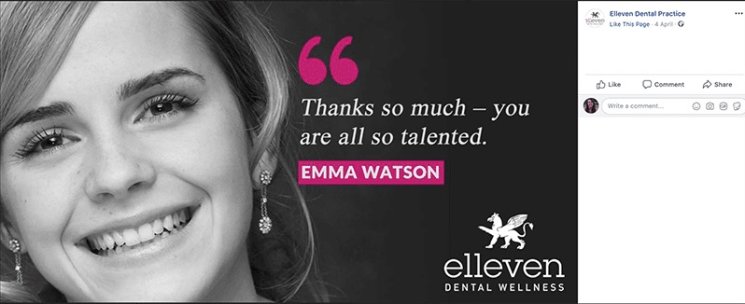
If you have a famous celebrity use your services, then you can leverage this to amplify your social reach.
Regularly post on your channels and ensure that the tone is in line with that of your website. Although some businesses automate their social media channels, it’s also important that they have a natural feel, so interact with your audience wherever possible.
Again, see how your competitors are utilising social media marketing and try and emulate the best examples while making note of tactics to avoid.
Keep up to date with the latest news and opinions
It goes without saying that the world of SEO and digital marketing changes and evolves on a daily basis, so it is integral that you keep up to date with some of the leading publications, blogs, podcasts, and thought leaders in the industry.
With that in mind, I’ve interviewed some of the SEO professionals working within the dental SEO niche and discussed some of their experiences and challenges that they have encountered:
I started off by asking Jordan Choo, Managing partner at Kogneta the following questions:
What’s the most challenging part of working within the Dental SEO niche?
The biggest thing is educating dentists on SEO and having them look at it from a holistic manner.
Take local link building as an example. If you’re building links to your site it shouldn’t just be to improve your practice’s authority and rankings. It’s also a brand-building exercise to spread awareness of your practice in your community.
This is where tools like ZipSprout can help out quite a lot as you’re able to build authoritative and quality links while building your brand.
Another example is that an SEO strategy doesn’t end with an appointment, it should be considered throughout the entire patient’s experience. As we know from Moz’s local ranking factor study, reviews play an important role when it comes to local SEO.
This is why it’s critical not just to have a post-appointment review solicitation strategy but, to also make sure that from a service delivery perspective the patient is happy.
How do you overcome the above challenge?
It all starts with educating dentists during the sales process and throughout the engagement. Shift them away from thinking in a siloed manner into thinking about their practice and marketing in a holistic fashion.
One exercise that I like to do is to do a customer journey mapping exercise with something like Uxpressia. This helps both myself and the doctor to map out step-by-step how a patient interacts with their practice. From there you can add all the points in which SEO can and should be incorporated into their practice.
A good tip for anyone doing SEO for dental clients?
Think about things holistically and understand that it requires work not just from the agency that you’re working with, but also you and your staff.
Then asked John Kramer, A marketing consultant with experience in Dental SEO in Spain the same questions;
What’s the most challenging part of working within the Dental SEO niche?
The dental niche is overcrowded and very competitive. In Spain, where I’m based, we have the highest number of registered dentists per 100 thousand inhabitants, 57.67.
This is 7 points above the European average, which is 50 dentists per 100 thousand inhabitants – (Data from 2012 OCDE Health Data)
Dental clients traditionally came through word of mouth and family connections. Internet marketing is a relatively new concept for many.
A large part of dental work is based on trust. People you trust recommending a dentist they trust. This level of trust is what we, as marketers need to push for our dental clients.
How do you overcome the above challenge?
Focusing on being transparent, personable and reinforcing E-A-T.
- We’ve used video quite extensively, for both testimonials and more commercial angles. People relate to people. And video helps tremendously for this. We’ve found this particularly important in the dental industry.
- Qualifications, certifications, courses that they’ve taken/given are important to push.
- I had a dental client who was a well known cosmetic dentist. He used to give courses and was known throughout dental schools and universities. We’d get him to write up lecture notes, ask for students to give feedback, have a continually evolving and changing events calendar on his site.
- Top of the funnel marketing and local – We’ve used geo-targeted Facebook ads quite successfully for dental businesses. Offers and promotions, anything to get people through the door. This has worked well for newer businesses.
- Gated content – a PDF download on teeth whitening. Once we have their email address we’d retarget with discounts for teeth whitening. Personalised copy and targeting.
- Old school – postcards and snail mail campaigns have worked well. People don’t expect it these days. Having a carefully addressed and personalised card arriving at your house is a welcome distraction.
A good tip for anyone doing SEO for dental clients?
Focus on people. The internet these days is about transparency and understanding. This is particularly important in the dental niche.
People’s decisions are heavily influenced by the trust. That trust needs to be earned. Having a personal and transparent web presence goes a long way in doing this.
I asked Fernando Balino the founder of The Harmonyc Group. who has extensive experience running Dental SEO campaigns the same set of questions. His answers were from his experience in the USA.
What’s the most challenging part of working within the Dental SEO niche?
Build Trust with Your Audience.
By far the most challenging part of the dental niche is generating, maintaining, and leveraging trust. The second most challenging aspect is local competition and exposure.
How do you overcome the above challenge?
Reviews Matter
Most people will read a staggering number of reviews before choosing any doctor (ZocDoc.com has somewhat changed the landscape for this, but that’s for another post).
Since they are doctors, dentists are no different—this makes trust one of the most important components to keep in mind when running dental-related marketing.
Explain Insurance and Costs to the Patient
The majority of negative dental reviews are related to billing. The reviews are staggeringly biased towards the financial aspects of the patient’s experience with the dentist or dental practice (of course, a lousy dentist will also get negative reviews for shoddy work).
If your patient knows the costs up-front, and you help guide them through their insurance (in the US most patients don’t understand their insurance, and dental work is very expensive), they are much less likely to leave a negative review.
Keep Track of Reviews
In short, keep track of Google My Business and Yelp reviews. Use the best reviews as testimonials, try smallthanks.withgoogle.com, and be very careful with how you respond to negative reviews.
Learn About Dentistry
I’m innately very curious, so I like to immerse myself in a client’s niche: learn the “lingo,” know the various treatments and areas of dentistry. When clients are reluctant to share important information, I always tell them: “I can’t market something that I know nothing about.”
Try to understand what you’re selling, focus on the patient’s needs, and generate relevant content to satisfy their search intent.
Know (Really Know) Your Competition
Because most dental practices serve local patients, local SEO should take a front seat for all searches that include the modifiers “best,” “near me,” “around me,” etc. This will yield an immediate advantage if you’re in a relatively small city, town, or village, or if you’re the only dentist in your area.
In heavily populated cities, however, competition can be tremendously difficult. In Manhattan, you might encounter multiple dentist offices (or dental practices) on the same block—there are literally thousands of practices.
If this is your case, you must keep a close eye on the competition. Know their strategies, read their reviews, follow their link-building efforts, maybe even pay them a visit! Yes, I have done that!
A good tip for anyone doing SEO for dental clients?
Local Exposure Really Works
Attempt to build local exposure through relevant blogs, interviews, magazines, etc.
Remember that people looking for dental services are not necessarily reading scientific journals on dentistry; they are consuming all sorts of media, and from a PR perspective, you might want to get mentioned in an important local media outlet.
People love seeing things like “Dr.Abc, one of the most renowned dentists in New York…”
Prioritize Backlinks with the Most Relevant Anchor Text
As far as link-building, marketers need to work closely with their dental clients to understand their most profitable services.
Define at most five different services that your client wants to rank for, and base your backlink efforts on that (don’t worry too much about DR or DA—focus on relevancy).
The anchor text of the backlink should contain the name of the service (e.g. Invisalign or Invisalign in New York) that’s most profitable for your client. Google will understand these cross-links very easily. The result is an increase in your own DR and a local boost for those particular terms.
This is very important when it comes to keyword research: find related keywords, and make sure to include their respective longer-tail phrases, as many searchers may know they have a dental problem, but don’t necessarily know its name.
For example, TMJ disorder causes pain at the hinges of the jaw, but rarely will people search for those terms (especially locally—you may have a high search volume of the exact phrase “TMJ disorder” nationally or globally, but those queries will be dominated by medical sites, such as WebMD).
Instead, your audience may use a local phrase such as “jaw pain treatment NYC.” If TMJ disorders are your speciality, then it is important to keep these variations in mind when generating content.
Finally, I asked James Norquay the founder of Prosperitymedia the same set of questions. His answers were from his experience in Australia.
What’s the most challenging part of working within the Dental SEO niche?
Dentists are busy clients so you need to ensure that content approvals are sent in advance and that full reports are sent on time. Making use of landing pages for dental and correct dental schema markup – https://schema.org/Dentist
How do you overcome the above challenge?
My partner is a dentist, so she assists with proofreading content for our dental clients. You need to do things in advance for dental clients. So, Ensure you format the schema correctly.
A good tip for anyone doing SEO for dental clients?
Ensure you do things correctly and do work on time and it will go well.
Now you got everything you need to start working on your Dental SEO campaign. If you need a hand reach out to me and I will help you execute your strategy and campaign.
Let’s talk & work together
Whether through my agency or as an independent consultant, I am here to help your business or project succeed.
Related articles
Stay updated!
Subscribe to get latest news, insights, technology, and updates.
" " indicates required fields




